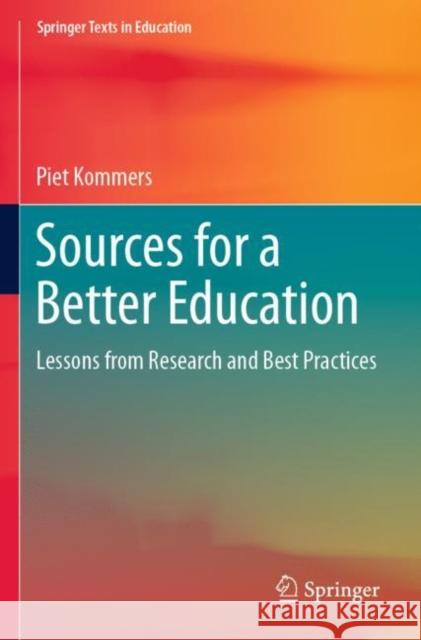Sources for a Better Education » książka



(netto: 306,68 VAT: 5%)
Najniższa cena z 30 dni: 308,41
ok. 16-18 dni roboczych.
Darmowa dostawa!
1. Tempting paradoxes.- 2. Learning: A Diverse process.- 3. Philosophical Pillars.- 4. Nature and Culture.- 5. Smart Education.- 6. The entrance of Technology.- 7. Cognitive Learning Tools.- 8. Concept Mapping.- 9. Mapping and Memory Load.- 10. Conceptual Entailments.- 11. Navigation in Hypertext.- 12. Mapping for Hypertext.- 13. Conceptual Awareness.- 14. Explicit Representations.- 15. Trailectics for conscience.- 16. Learning, playing, working.- 17. Media as Catalyst.- 18. The Information Age.- 19. ICT in Secondary Education.- 20. Twenty-First Century.- 21. The Use of Web Tools.- 22. Teacher Training.- 23. Searching for Search Engines.- 24. Visual Imagination.- 25. Virtual Reality for Learning.- 26. Virtual Surgical Training.- 27. Educational Design.- 28. Vocational Education.- 29. Construals.- 30. Open Educational Resources.- 31. Steam During Covid-19.- 32. Programming Skills.- 33. Communities of Practice.- 34. Professional Development.- 35. International Exchange.
Dr. Piet Kommers is an early pioneer in media for cognitive- and social support. His doctoral research explored methods for hypertext and concept mapping in learning. Since 1982 he developed educational technology for teacher training. His main thesis is that technology is catalytic for human ambition and awareness. His main function is associate professor in the University in Twente, The Netherlands and adjunct/visiting professor in various countries. He taught more than fifteen bachelor-, master- and PhD courses and supervised more than 30 PhD students.
He instigated and coordinated the NATO Advanced Research Workshop on Cognitive Technologies in 1990 and a large series of Joint European Research Projects in: authoring multimedia, web-based learning, teacher education, virtual 3d worlds, constructivist learning, social media, web-based communities and international student exchange.
UNESCO awarded his work in ICT for Education in Eastern Europe with the title of Honorary Professor. The Capital Normal University in Beijing awarded his work with the title of Honorary Doctor. He is member of advisory boards in ministries of education and academia of sciences in Singapore, Finland and Russia.
Piet Kommers is the initiator of the international journal for web-based communities and overall chair of the IADIS conferences on societal applications of ICT. Since the late nineties he gave more than 40 invited and keynote lectures at main conferences in the fields of education, media and communication.
His books and journal articles address the social and intellectual transformations at each transition from “traditional” into the “new” media. Instead of regarding media as extrapolating, supplanting, vicarious or even disruptive, Piet’s view is that new media elicit and seduce both individuals and organizations to reconsider human nature and challenge existential awareness at that very moment. His main publications and citation score can be found here. His workshop templates and experiences have been implemented into the UNESCO IITE reports, policy briefings and Master Course. The books and journal articles of Piet Kommers reach the level of 9500 citations and the h-index of 36.
“Renaissance man and philosopher Piet Kommers presents us with an interesting question: What makes education exciting? His book covers a range of lessons learnt through research and practice, covering philosophies and paradoxes, ranging from learning to learn to machine learning for learning. He takes us on an exciting, comprehensive journey of just about every conceivable aspect of technology and education. This is a must-have for every 21st Century bookshelf!” By: Johannes Cronjé, professor of Digital Teaching and Learning at the Cape Peninsula University of Technology, South Africa.
“New technologies change teaching, and we need to understand how application of such technologies can improve the learning. This book provides such knowledge and I wish I had it when I started teaching at university many years ago.” By: Jan Frick, Professor at University of Stavanger, Norway.
"Piet Kommers delivers a very thorough book with a holistic perspective on Learning Technologies. This book is a result of many years of experience that the author has in Higher Education. It comprises lessons learned from the author´s professional career, including inputs from European Union research projects, as well as diversified interactions with a wide range of Peoples and Cultures .. " By: Pedro Isaias, associate professor at the University of New South Wales (UNSW – Sydney), Australia.
“Distinguished Professor and Thinker Dr. Piet Kommers presents the academic community with a new horizon on education that reflects the current and future technology trends in the e-Learning and Fast Internet ubiquity. The Book discusses the current and most recent advances in research and application of most effective learning methods in conjunction with the future directions in machine learning in support of learning .. ” By: Eduard Babulak, Professor, Computational Sciences, Liberty University, Lynchburg, USA.
"Well-known scientist, (e-)learning expert and philosopher Piet Kommers presents us lessons learnt through research and practice, covering philosophies and paradoxes, ranging from learning to learn to machine learning. In 35 chapters he takes us on an exciting, comprehensive journey of just about every conceivable aspect of technology and education .. " By: Eugenia Smyrnova-Trybulska, Dr. hab., associate professor, University of Silesia in Katowice, Poland.
“The book presents a mosaic of assets reflecting the vast international experience in research and realization of learning technologies of the author, honourable professor of the UNESCO Chair in New information technologies in education for all, Piet Kommers. Describing various aspects of learning strategies, approaches, techniques and technologies in a concise way, he engages the readers into the mental construction of a "big picture" and makes them reconsider routine processes of teaching and learning .. ” By: professor Volodymyr Gritsenko, Director of the International Research and Training Centre for Information Technologies and Systems, National Academy of Sciences and Ministry of Education and Science of Ukraine, Head of the UNESCO Chair.
1997-2026 DolnySlask.com Agencja Internetowa
KrainaKsiazek.PL - Księgarnia Internetowa









